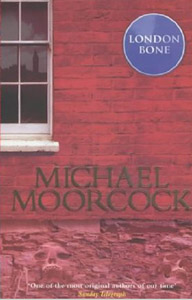
photo by Anthony Kelly
by Drew Whittet
To get some idea of Michael Moorcock’s prolific output we might consult one of his larger tomes. A book covering his short non-fiction, 1956-2006, comes in at 720 pages and weighs a healthy 2 Kilos (4.4lbs). His short stories within that same period must run into the hundreds, engulfing several genres, including fantasy, historical fiction, social satire, science fiction and speculative fiction, often combining several of these categories in a single story. Even if we limited ourselves to those stories set in his native London, our task would be vast. Here, I would like to consider his story ‘London Bone’, from the collection of the same name.
Moorcock has many different styles, priding himself on his flexibility. He enjoys sticking with familiar characters, often dropping them into weird and uncomfortable settings. This is not the case in ‘London Bone’. The protagonist, Raymond Gold, seems very much at home and at ease with himself in his London. Ray is a bit of a wide boy, with a slightly dodgy job. He likes to call himself a ‘cultural speculator’; others call those who ply his trade ‘scalpers’ – a trader who buys tickets to West End shows at their face value, later selling them on at a profit. Basically, he’s a ticket tout, but he considers himself to be a semi-legit businessman, or even a venture capitalist. He feels that any defender of the free market would love him: ‘He would surely applaud my enterprise in the buccaneering spirit of the free market. Venture capitalism at its bravest.’
 Ray’s story begins with a brief autobiography. It might therefore be useful to include some pertinent points from Moorcock’s own biography. The author was very much part of the flourishing cultural explosion of London in the Sixties and continued to spend time there during the Seventies. His activities included: editing, writing and dabbling in a real rock’n’roll lifestyle. He even wrote lyrics and performed with the cult rock band Hawkwind.
Ray’s story begins with a brief autobiography. It might therefore be useful to include some pertinent points from Moorcock’s own biography. The author was very much part of the flourishing cultural explosion of London in the Sixties and continued to spend time there during the Seventies. His activities included: editing, writing and dabbling in a real rock’n’roll lifestyle. He even wrote lyrics and performed with the cult rock band Hawkwind.
‘London Bone’ doesn’t deal with the cultural underground, rather, it engages with London’s criminal underworld and, eventually, literally digging around in the subterranean layers of the city. One theme in the story is, perhaps, vice versus virtue. It is not so much honour amongst thieves; it’s more like a jovial rivalry. Raymond meets up with his boyhood friend Bernie Michaud, who is kosher, but not up to Raymond’s high opinion of himself: “I’m a quintessential Londoner, I am. I’m a Cockney gentleman.” There are also many evocative passages reminding us of Kray-era gangsters, sometimes conjuring up images of their sartorial elegance: “I wear camel hair in winter and a Barraclough’s in summer.”
Raymond Gold usually deals in services, not goods, but after experiencing some economic problems he is forced to change his trade. The commodity in which he decides to trade is initially identified as bones from the long-extinct Mastodon. The bones can be branded and sold as mammoth ivory. Bernie knows where to dig for them, in London’s heavy clay, and they quickly set to work: ‘…we hoped to have the whole bloody mastodon out of the deep clay and nicely earning for us.’
I won’t reveal exactly how the plot unfolds, suffice to say Raymond and his colleagues become fabulously rich, but more than a little unpopular when the true origin of the ‘ivory’ is revealed.
Moorcock moved to the USA in 1994 for personal reasons. After this date, London was not to feature as frequently in his fiction as it had done in the past. Alongside Moorcock’s geographical move came the shifting fortunes of London. Many Londoners not only witnessed the end of a semi-mythological progressive London, but were also forced to suffer the further indignity of seeing it replaced by a rapacious, Disneyfied version of itself. London was selling everything, body and soul.
 The story combines retrospective and prospective views. It is set in the near future, but Moorcock would surely not place himself amongst that brave group of writers who might see themselves as futurologists. J.G. Ballard writes that many modern speculative short stories sit closely and comfortably alongside folk stories or parables. This is certainly the case with many of Moorcock’s stories. The list of writers working in this tradition might also include the boundless imagination of Jorge Luis Borges, taking in Poe, Wells and many others. Ballard continues with the following observation:
The story combines retrospective and prospective views. It is set in the near future, but Moorcock would surely not place himself amongst that brave group of writers who might see themselves as futurologists. J.G. Ballard writes that many modern speculative short stories sit closely and comfortably alongside folk stories or parables. This is certainly the case with many of Moorcock’s stories. The list of writers working in this tradition might also include the boundless imagination of Jorge Luis Borges, taking in Poe, Wells and many others. Ballard continues with the following observation:
I was interested in the real future that I could see approaching, and less in the invented future that science fiction preferred. The future, needless to say is a dangerous area to enter, heavily mined with a tendency to turn and bite your ankles.
As in many of his stories, Moorcock offers us some ambiguities in defining the moral position of his protagonist. Raymond Gold doesn’t suffer the inner turmoil of some Moorcock’s fantasy figures, but the humour within the tale compensates for the loss of the author’s familiar tropes. The visionary depiction of present day London and the ironic digs at the nostalgia industry are among the more endearing features of this intriguing tale. Part of the charm of this story lies in Moorcock’s clear sense that there is something rotten in the state of degenerate capitalism. Poignantly, the crooked carry out seemingly harmless fraudulent crime and often get away with it. And ever present is the terrible realisation that some cheerful cockneys would sell the very soil on which their city stands.

